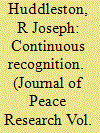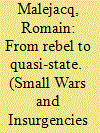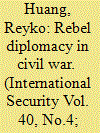|
|
|
Sort Order |
|
|
|
Items / Page
|
|
|
|
|
|
|
| Srl | Item |
| 1 |
ID:
176047


|
|
|
|
|
| Summary/Abstract |
How do self-determination groups move toward diplomatic recognition? Although recognition is the dominant activity used to understand international sovereignty, it is perhaps the most costly decision states make towards these groups. Third parties have many substantial interactions with aspiring states, building their sovereignty by other important means. I argue that our understanding of international sovereignty can be improved by conceptualizing it as a dynamic, continuous process, reflected in foreign policy decisions short of the legal recognition. I create a Bayesian latent variable model of international sovereignty, using bilateral data on diplomatic exchange, IGO voting, sanctions, military aid, and intervention in separatist conflicts. Complementing prior work on international sovereignty, my measure provides support for important theoretical expectations previously explored using only recognition as a measure of sovereignty. I find that diplomatic recognition, extant violence, separatist victory, and sour third-party–incumbent relations positively impact latent sovereignty of separatists, while concern for precedent negatively impacts it.
|
|
|
|
|
|
|
|
|
|
|
|
|
|
|
|
| 2 |
ID:
153619


|
|
|
|
|
| Summary/Abstract |
How do warlords build their legitimacy and eventually exert authority? The case of Afghan leader Ahmad Shah Massoud demonstrates that warlords do not only build legitimacy through the internal provision of goods and services to the population under their control, but also build their legitimacy by projecting authority externally, through the development of their own form of diplomacy. In this article, I show that warlords develop complex and complementary legitimisation strategies that extend beyond their territorial realms to include consequential relationships with foreign actors.
|
|
|
|
|
|
|
|
|
|
|
|
|
|
|
|
| 3 |
ID:
145230


|
|
|
|
|
| Summary/Abstract |
In the midst of civil war, rebel groups often expend significant resources opening offices in foreign capitals, meeting with heads of state, expanding their overseas networks, appealing to international organizations, and contacting foreign media. Existing scholarship has generally neglected international diplomacy as an aspect of violent rebellion, focusing instead on rebel efforts at domestic organization. A systematic documentation of rebel diplomacy in post–1950 civil wars using new quantitative and qualitative data shows that rebel diplomacy is commonplace and that many groups demonstrate as much concern for overseas political campaigns as they do for domestic and local mobilization. Diplomacy, furthermore, is not a weapon of the militarily weak, but a tactical choice for rebel groups seeking political capital within an international system that places formidable barriers to entry on nonstate entities. An original analysis of the diplomacy of the National Union for the Total Independence of Angola in the Angolan civil war using archival sources further demonstrates why rebels may become active diplomats in one phase of a conflict but eschew diplomacy in another. More broadly, the international relations of rebel groups promise to be an important new research agenda in understanding violent politics.
|
|
|
|
|
|
|
|
|
|
|
|
|
|
|
|
|
|
|
|
|